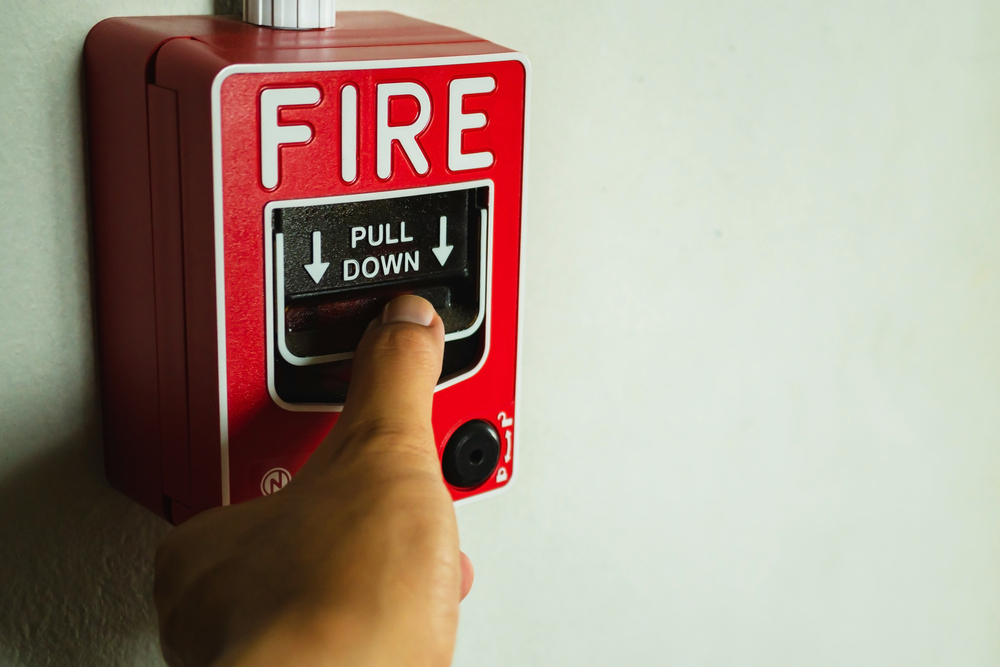 22
Oct
22
Oct
Commercial Fire Alarm System: A Guide For Business Owners
- 0 Comment(s)
- October 22, 2024
Every business, regardless of size, is required to take fire safety seriously. A well-maintained commercial fire alarm system is not just a legal necessity but a critical component of protecting lives and property. With thousands of structure fires occurring every year, the importance of having a comprehensive fire alarm system in place cannot be overstated. This guide will help business owners understand how these systems work, why they are crucial, and how proper installation and maintenance contribute to workplace safety.
Why Your Business Needs a Commercial Fire Alarm System
The risks of fire in any building are significant, but small businesses and commercial establishments face even greater threats due to the potential for loss of property, disruption to operations, and the danger to employees and customers. A commercial fire alarm system not only detects fires early but also alerts everyone in the building to evacuate, helping to avoid injuries and fatalities.
In addition to providing a safeguard against fire, these business fire alarm systems are required by law. Fire codes dictate that every business must have a functioning fire alarm system, regardless of its size or industry. For companies looking to open a new location or expand, navigating the regulations surrounding fire alarm installation can be challenging, especially if you are unfamiliar with the specific components.
Key Components of a Commercial Fire Alarm System
Commercial fire alarm systems consist of several interconnected devices that work together to detect, alert, and mitigate fire risks. Each component plays a specific role in ensuring the safety of the occupants and the property.
● Smoke Detectors
Smoke detectors are essential to any fire alarm system. These devices detect smoke particles in the air, often before flames are visible, providing early warning of a potential fire. Most systems use photoelectric sensors, which activate an alarm when smoke particles cross a light beam within the device. Proper placement and quantity of smoke detectors are determined by local fire codes, but they are typically installed in key areas like hallways, offices, and storage rooms to offer comprehensive coverage.
● Carbon Monoxide Detectors
While fire detection is the primary purpose of these systems, carbon monoxide (CO) detectors are a vital addition. CO is a colorless, odorless gas that is produced whenever fuel burns incompletely, which means any business with gas-powered equipment or water heaters is at risk. CO detectors use electrochemical sensors to detect unsafe levels of carbon monoxide and alert building occupants to evacuate. Without these detectors, the presence of this dangerous gas could go unnoticed, posing a significant health risk to employees and customers alike.
● Hand Pull Stations
Hand pull stations are the manual triggers for your fire alarm system. Located in easy-to-access areas, these devices allow anyone in the building to activate the alarm in the event of a fire. This is especially important in cases where smoke or heat detectors have not yet been triggered. Quick manual activation can help prevent a fire from spreading and ensure everyone inside has time to evacuate safely.
● Horns and Strobes
Once the fire alarm system detects an issue, horns and strobes are activated throughout the building to alert everyone to the danger. Horns provide the audible warning, while strobes offer a visual cue, ensuring that everyone—regardless of location or hearing ability—is aware of the emergency. These devices are installed according to fire code standards to ensure that they can be heard and seen by all occupants, maximizing the chances of a successful evacuation.
● Voice Evacuation Systems
For large commercial buildings or facilities with many occupants, voice evacuation systems offer enhanced safety features. Instead of relying solely on horns and strobes, these systems broadcast clear, pre-recorded messages to guide people through a safe evacuation process. By offering specific instructions tailored to the building’s layout and potential hazards, voice evacuation systems help to avoid confusion and ensure a more organized response during emergencies. These systems are particularly useful in high-occupancy buildings such as educational institutions, malls, and entertainment venues.
Importance of Regular Maintenance for Fire Alarm Systems
Installing a commercial fire alarm system is just the first step in protecting your business. Regular fire alarm maintenance is key to ensuring that all components function properly in the event of an emergency. Most fire codes require that commercial fire alarm systems be inspected and serviced at least once a year, though more frequent checks may be necessary depending on the complexity of the system and the building’s use.
Working with a professional commercial fire extinguisher service can help ensure that your system stays compliant with fire safety regulations. Routine inspections will cover essential aspects like checking smoke and CO detectors, ensuring that hand pull stations are functional, and verifying that the horn/strobe units are correctly positioned and working. Technicians will also test the system’s control panel to make sure it can handle a fire emergency without failure.
If your business relies on fire extinguishers as part of its fire safety plan, it’s important to pair these with a well-maintained fire alarm system. Fire extinguishers may offer quick response in the event of a small, manageable fire, but only a fire alarm system can ensure that everyone in the building is notified of the danger in time to evacuate. A company offering fire extinguisher services can also assist with the overall maintenance of your fire safety equipment, keeping both extinguishers and alarms up to code.
Ensuring Fire Code Compliance for Your Business
Staying compliant with local fire codes is not only a legal requirement but a critical aspect of fire safety. Building codes dictate the specific types and placements of fire alarm components, from smoke detectors to voice evacuation systems.
Failing to adhere to these codes can result in hefty fines or, worse, endanger lives. Regular inspections by certified professionals ensure that your system is fully compliant and that all devices function as intended.
Additionally, compliance helps maintain favorable insurance rates, as many providers require evidence of adherence to safety regulations. Keeping up with these requirements reduces liability, enhances safety, and provides peace of mind that your business is well-protected against potential fire hazards.
Small Business Fire Safety: A Necessity, Not an Option
For small businesses, fire safety often feels like just another cost in a long list of operational expenses. However, the potential consequences of a fire far outweigh the investment in a quality commercial fire alarm system. Whether you operate a retail store, restaurant, or office, ensuring the safety of your employees and customers should be a top priority. Fires don’t discriminate based on the size of a business, and without proper protection in place, even a small fire can lead to devastating losses.
For business owners who operate from residential homes converted into commercial spaces, it’s crucial to remember that home-grade smoke detectors and CO alarms are not sufficient for a commercial environment. Fire codes for businesses differ significantly from those for residential properties, and failing to meet these codes can result in fines, shutdowns, and increased insurance costs.
How We Help Protect Your Business
Yadkin Fire & Safety recognizes the unique challenges that businesses face when it comes to fire safety. Our team offers fast, reliable service and competitive pricing, helping you stay compliant with local regulations and keeping your fire alarm system in top working order. We offer prompt turnaround times for cylinder services to minimize downtime and keep your operations running smoothly.
We prioritize educating our clients to ensure they understand how their system works and what steps they need to take for regular maintenance. Whether you need system inspections or cylinder services, we are committed to keeping your business safe from fire hazards.

